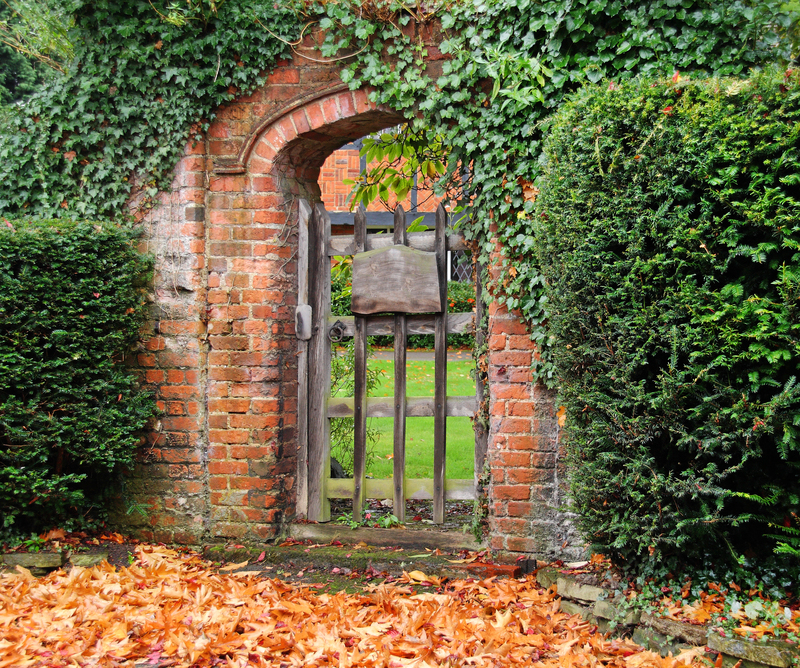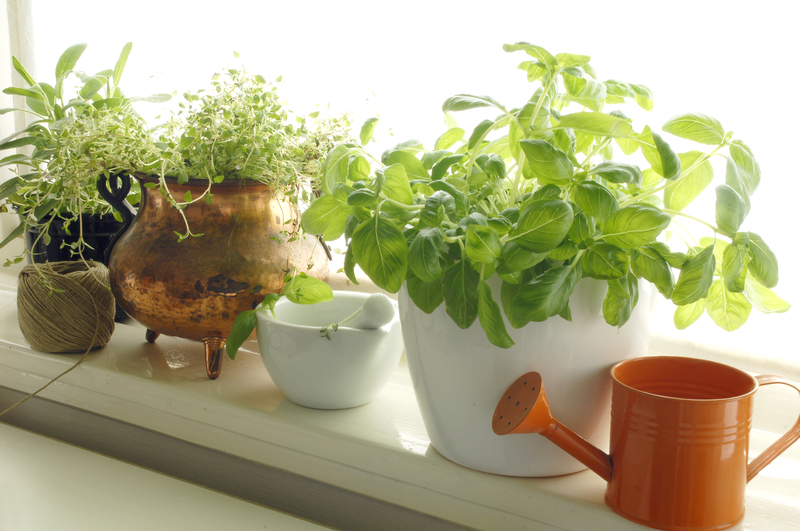Cultivate your green thumb with our 9 expert gardening tips for beginners
Posted on 26/08/2025
Cultivate Your Green Thumb with Our 9 Expert Gardening Tips for Beginners
Are you dreaming of nurturing lush plants, vibrant flowers, and harvesting your own vegetables, but not sure where to start? Cultivating your green thumb is an exciting journey, and with the right guidance, anyone can become a successful gardener. Whether you have a sprawling backyard or a few pots on a sunny balcony, our gardening tips for beginners will help set you up for success and usher you into a world of natural beauty and rewarding growth.

Why Gardening? The Benefits of Nurturing Your Green Thumb
Gardening goes far beyond beautifying your surroundings. Embracing the gardener's lifestyle provides physical exercise, reduces stress, boosts mental health, and offers the unique satisfaction of creating something with your own hands. Eat fresher, tastier produce, watch your blooms brighten your living space, and establish a deeper connection to nature. Ready to get started?
Top 9 Expert Gardening Tips for Beginners
Let's dive into our essential gardening tips that will help you grow your green thumb and set you firmly on the path to gardening success. From choosing the right plants to mastering watering techniques, these tips are tailored for beginner gardeners eager to see their efforts flourish.
1. Choose the Right Location for Your Garden
- Sunlight is Key: Most vegetables and many flowers thrive with a minimum of 6 hours of direct sunlight each day. Observe your chosen garden space or windowsill to ensure it receives the recommended sunlight before planting.
- Convenience and Accessibility: Place your garden where you will see and remember to tend it. Ease of access encourages consistency in care.
- Microclimates: Your yard may have sunny, shaded, or damp areas. Note these differences and select plants suitable for each microclimate.
Pro Garden Tip: If you only have shade, plenty of beautiful plants (like hostas, ferns, and impatiens) thrive without full sun!
2. Start with Easy-to-Grow Plants
- Low-Maintenance Choices: As a beginner, select plants known for their hardiness and low-maintenance needs. Some great starter options include marigolds, sunflowers, zinnias, lettuce, radishes, and herbs like basil or mint.
- Companion Planting: Research which plants grow well together to maximize space and help repel pests naturally.
- Patience Pays Off: Allow yourself to make mistakes and learn as you grow. Each season brings new lessons.
3. Understand Your Soil
- Soil Testing: Healthy gardens start with healthy soil. Consider testing your soil for pH and nutrient levels (many garden centers offer affordable kits).
- Amend as Needed: Add compost, organic matter, or specific amendments based on your soil test results to enrich your garden beds.
- Well-Draining Soil: Most plants need soil that drains well. Mix in organic compost or sand to improve clay-heavy soils.
Did you know? Feeding your soil is just as important as feeding your plants!
4. Water Wisely: Find the Right Balance
- Morning is Best: Water early in the morning to reduce evaporation and disease risk.
- Deep, Infrequent Watering: Give plants a thorough soak rather than frequent shallow sprinklings. This encourages roots to grow deeper.
- Check Before You Water: Stick your finger an inch or two into the soil. If it's damp, hold off on watering.
- Mulch Retains Moisture: Use mulch around your plants to keep soil moist longer and suppress weeds.
5. Mulching: Your Garden's Best Friend
- What is Mulch? It's a protective layer of organic or inorganic material (like shredded bark, compost, or straw) placed around your plants.
- Benefits of Mulching: Mulch stabilizes soil temperatures, retains moisture, prevents weed growth, and adds organic matter as it decomposes.
- Keep mulch a few inches from plant stems to prevent rot and pest problems.
6. Feed and Fertilize Properly
- Start with Compost: Amend your soil with compost or well-rotted manure for nutrients and improved structure.
- Understand Fertilizer Needs: Different plants have varying fertilizer needs. Don't over-fertilize, as this can harm your plants.
- Organic Options: Choose slow-release, natural fertilizers or make your own using kitchen scraps for sustainable growth.
Tip: Read fertilizer instructions carefully to avoid "burning" your plants with too much nitrogen.
7. Learn to Recognize and Manage Pests
- Identify Common Pests: Aphids, slugs, snails, and caterpillars are frequent visitors in beginner gardens.
- Encourage Beneficial Insects: Ladybugs, lacewings, and bees help control pests and pollinate your plants.
- Natural Pest Control: Handpick bugs, use neem oil, or introduce barriers rather than relying on harsh chemicals.
Remember: Not all bugs are bad! Many insects are helpful to your garden ecosystem.
8. Prune and Deadhead for Health and Beauty
- Pruning: Remove dead or diseased branches, thin overcrowded growth, and shape your plants for better air circulation and aesthetics.
- Deadheading: Regularly remove spent blooms from flowering plants to encourage more blossoms instead of seed-making.
- Clean Your Tools: Always sanitize your pruners to prevent spreading diseases between plants.
9. Keep a Garden Journal
- Track Your Progress: Record planting dates, weather, results, pests, successes, and challenges.
- Learn From Experience: Reviewing your notes helps you repeat what worked and avoid past mistakes each season.
- Dream Big: Sketch ideas, future plans, and plant wish lists to keep you motivated and organized.
Common Mistakes Beginner Gardeners Should Avoid
- Overwatering or underwatering -- Find the right balance by checking soil moisture before watering.
- Planting too much too soon -- Start small and expand as your confidence grows.
- Skipping soil preparation -- Don't neglect amending your soil before planting.
- Ignoring plant labels -- Always read and follow care recommendations for each plant.
- Forgetting to mulch -- Mulch is vital for retaining moisture and reducing weeds.
- Neglecting regular checks -- Stroll through your garden daily to spot issues before they escalate.
Essential Gardening Tools for Beginners
Investing in basic quality tools can make your gardening experience much easier and more enjoyable. Here's a foundational toolkit for every new gardener:
- Trowel: For digging, planting, and potting.
- Hand fork: Useful for breaking up tough soil and weeding.
- Pruning shears: For trimming and shaping plants.
- Watering can or hose: Choose based on your garden's size.
- Gloves: Protect your hands from thorns, soil, and blisters.
- Rake and shovel: Essential for preparing beds and clearing debris.
Tip: Clean and maintain your tools after each use for longevity and plant health.
Gardening for Limited Spaces: Container and Urban Gardening
No backyard? No problem. You can cultivate your green thumb with container gardening on a balcony, rooftop, or even a sunny window. Many herbs, leafy greens, and flowers grow beautifully in pots. Here's how to get started:
- Use the Right Containers: Ensure your pots have drainage holes to avoid waterlogged roots.
- Choose Compact Plants: Leafy greens, dwarf tomatoes, peppers, and nasturtiums are perfect for containers.
- Quality Potting Mix: Use a soil mix formulated for containers -- it drains better than garden soil.
- Don't overcrowd: Give plants space to thrive and expand.

Boost Your Green Thumb: Gardening Books and Resources
There are endless resources available to help you improve your gardening skills. Here are a few recommendations to enhance your plant knowledge:
- "The Garden Primer" by Barbara Damrosch -- A beloved, comprehensive guide for beginners.
- "Rodale's Basic Organic Gardening" by Deborah L. Martin -- Perfect for those keen on eco-friendly gardens.
- Local cooperative extensions and botanical gardens often offer free workshops and resources tailored to your climate.
- Join online forums, follow plant experts on social media, and watch video tutorials for visual learners.
Final Thoughts: Your Green Thumb Journey Begins Now
With these expert gardening tips for beginners, you're equipped to embark on your gardening adventure confidently. Remember, every green thumb is cultivated through patience, observation, and hands-on experience. Don't be afraid to experiment, embrace mistakes as learning opportunities, and celebrate even the smallest success.
One final tip: Enjoy the process! Gardening is ultimately about connecting with nature, finding tranquility in the soil, and watching the fruits (and flowers) of your labor bloom. So put on your gardening gloves and let your journey to growing your green thumb begin!
Looking for more gardening inspiration? Bookmark this article for easy reference and revisit our site for regular updates on expert gardening advice and techniques!
Latest Posts
The First Steps to Rejuvenating a Neglected Yard
Making Your Garden a Kid's Wonderworld
Gardening Tips for Harmonizing with Your Dog
Weatherproofing Your Garden from Severe Damage
Transforming Our Planet: Gardening's Impact on Climate Change

